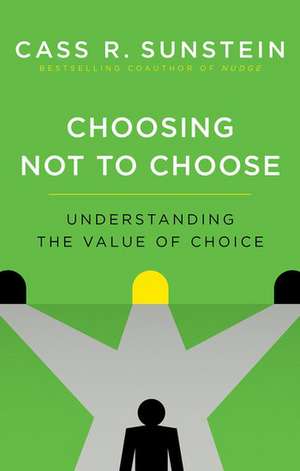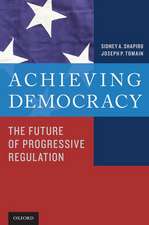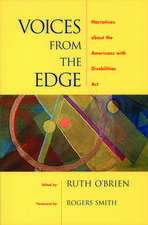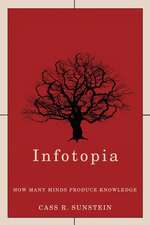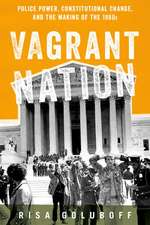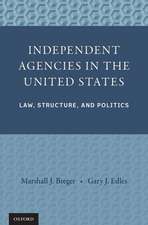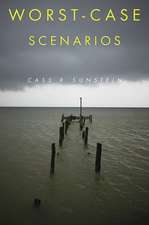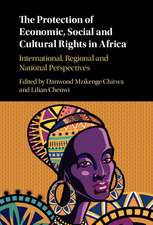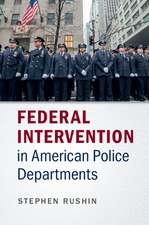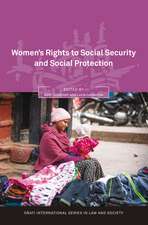Choosing Not to Choose: Understanding the Value of Choice
Autor Cass R. Sunsteinen Limba Engleză Paperback – 5 ian 2017
Preț: 179.71 lei
Nou
Puncte Express: 270
Preț estimativ în valută:
34.40€ • 35.77$ • 28.82£
34.40€ • 35.77$ • 28.82£
Carte disponibilă
Livrare economică 20 februarie-06 martie
Preluare comenzi: 021 569.72.76
Specificații
ISBN-13: 9780190457297
ISBN-10: 0190457295
Pagini: 240
Dimensiuni: 201 x 130 x 15 mm
Greutate: 0.27 kg
Editura: Oxford University Press
Colecția OUP USA
Locul publicării:New York, United States
ISBN-10: 0190457295
Pagini: 240
Dimensiuni: 201 x 130 x 15 mm
Greutate: 0.27 kg
Editura: Oxford University Press
Colecția OUP USA
Locul publicării:New York, United States
Recenzii
This book will profoundly alter the way you think about choices; the choices you make for yourself, the choices you make for others and the choices you allow others to make for you. With talent and ease Sunstein draws from politics, psychology, economics to help us understand ourselves and the world we live in, and how we may improve both. A delightful, thought provoking, read." -Tali Sharot, Associate Professor of Cognitive Neuroscience, University College
From health care, education, and privacy, to travel, food, and finance, we face increasing arrays of choices. Occasionally, we have the knowledge and the bandwidth to choose well. Often, we do not. When are choices liberating, and bound to improve well-being? And when is it better not to choose? Should we worry about paternalism when others choose for us? And when we prefer not to choose, might it be paternalistic to require that we do so? Sunstein masterfully blends economic, legal, philosophical, and behavioral considerations to illuminate a topic of tremendous importance to policy making and to everyday life. Anyone who cares about the choices that they make should choose to read this book!" -Eldar Shafir, Professor of Psychology and Public Affairs, Princeton University
There is no-one better placed than Cass Sunstein to make the case for Choosing Not to Choose. Drawing on the author's own influential research and that of other experts, this book provides a deeply insightful exploration of both the value of choice and of not choosing. It is a must read for anyone interested in personal freedom and human wellbeing." -Paul Dolan, Professor of Behavioral Science, The London School of Economics and Political Science
In Choosing Not to Choose, Cass Sunstein provides the best analysis to date of the pros and cons of decision by default, making a strong case for personalized default rules in many domains. Readers will particularly appreciate the near-encyclopedic survey of empirical findings to help them identify the arenas of social life in which they will be better off or worse off by delegating decisions." -Jon Elster, Robert K. Merton Professor of Social Science, Columbia University
This monumental volume is the authoritative source on the subject. As anthropogenic climate change puts a deeper stamp on the planet, this book's significance is certain to rise." -Jim Chen, Jurisdynamics Blog
Summing Up: Recommended. All undergraduate, graduate, and research collections." -S. Mitropolitski, University of Ottawa, CHOICE
Choosing Not to Choose provides an excellent example of how to bring social science to bear upon policy-related problems." -Peter Stone, Ussher Assistant Professor of Political Science, Trinity College, Dublin, Ireland, Metapsychology
From health care, education, and privacy, to travel, food, and finance, we face increasing arrays of choices. Occasionally, we have the knowledge and the bandwidth to choose well. Often, we do not. When are choices liberating, and bound to improve well-being? And when is it better not to choose? Should we worry about paternalism when others choose for us? And when we prefer not to choose, might it be paternalistic to require that we do so? Sunstein masterfully blends economic, legal, philosophical, and behavioral considerations to illuminate a topic of tremendous importance to policy making and to everyday life. Anyone who cares about the choices that they make should choose to read this book!" -Eldar Shafir, Professor of Psychology and Public Affairs, Princeton University
There is no-one better placed than Cass Sunstein to make the case for Choosing Not to Choose. Drawing on the author's own influential research and that of other experts, this book provides a deeply insightful exploration of both the value of choice and of not choosing. It is a must read for anyone interested in personal freedom and human wellbeing." -Paul Dolan, Professor of Behavioral Science, The London School of Economics and Political Science
In Choosing Not to Choose, Cass Sunstein provides the best analysis to date of the pros and cons of decision by default, making a strong case for personalized default rules in many domains. Readers will particularly appreciate the near-encyclopedic survey of empirical findings to help them identify the arenas of social life in which they will be better off or worse off by delegating decisions." -Jon Elster, Robert K. Merton Professor of Social Science, Columbia University
This monumental volume is the authoritative source on the subject. As anthropogenic climate change puts a deeper stamp on the planet, this book's significance is certain to rise." -Jim Chen, Jurisdynamics Blog
Summing Up: Recommended. All undergraduate, graduate, and research collections." -S. Mitropolitski, University of Ottawa, CHOICE
Choosing Not to Choose provides an excellent example of how to bring social science to bear upon policy-related problems." -Peter Stone, Ussher Assistant Professor of Political Science, Trinity College, Dublin, Ireland, Metapsychology
Notă biografică
Cass R. Sunstein is the Robert Walmsley University Professor at Harvard University. From 2009 to 2012, he was Administrator of the White House Office of Information and Regulatory Affairs. He is the founder and director of the Program on Behavioral Economics and Public Policy at Harvard Law School. He has been involved in law reform activities in nations all over the world, often with a focus on behavioral economics. He is the author of many articles and books, including Republic.com (2001); Designing Democracy: What Constitutions Do (2001); Infotopia: How Many Minds Produce Knowledge (2006); Nudge: Improving Decisions about Health, Wealth, and Happiness (with Richard Thaler, 2008), Going to Extremes: How Like Minds Unite and Divide (2009); and Simpler: The Future of Government (2013).
